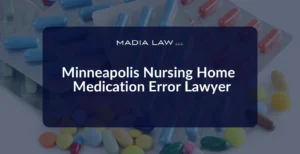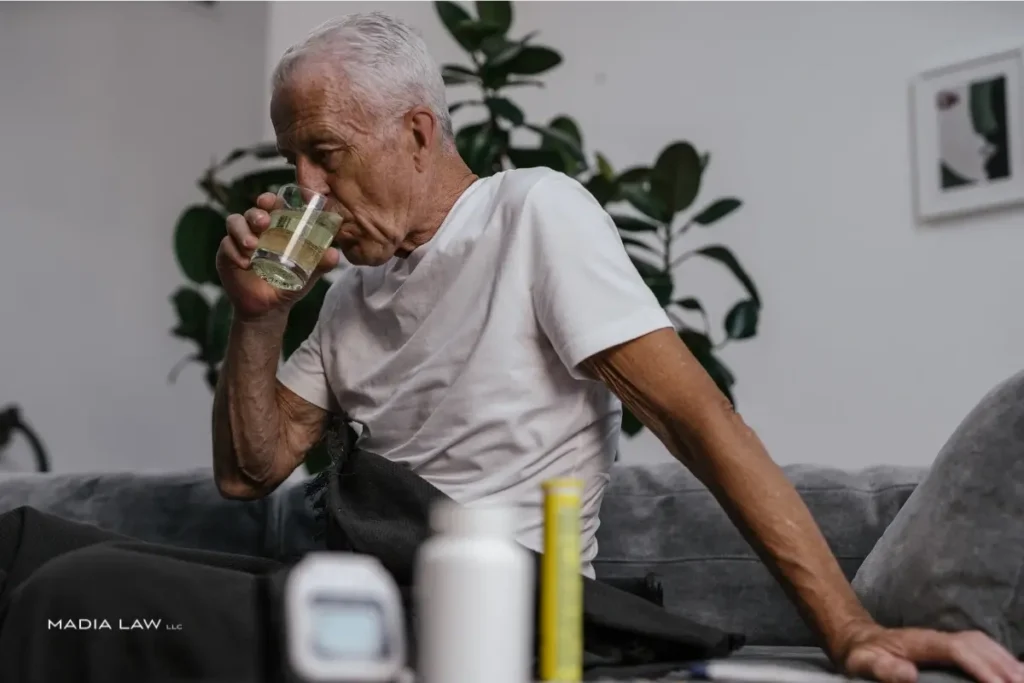
Worried about a medication mistake in a Minnesota nursing home? You are not alone, and legal help is available.
When something doesn’t feel right about a loved one’s care, it’s okay to ask questions. Medication issues in elder care settings can affect health and well-being, but families can take confident steps to find answers and protect their loved ones.
At Madia Law LLC, we guide families in Minnesota through the legal process with care and clarity. Our team helps you understand your options, review records, and take appropriate legal steps if needed. We’re committed to making sure nursing homes meet the high standards every resident deserves.
If you need support navigating a possible medication error, we are here to help professionally, respectfully, and with a strong focus on your family’s peace of mind.
What Does a Nursing Home Medication Error Lawyer Do?
A nursing home medication error lawyer helps families understand what happened, uncovers the truth through investigation, and takes legal steps to seek justice. Their work goes far beyond filing paperwork. From reviewing facility records to working with medical experts and building a strong case for court, an experienced attorney ensures every detail is handled with care and precision.
At Madia Law LLC, we represent families in Minnesota whose loved ones may have suffered from medication-related mistakes in nursing homes. Our legal process is thorough, strategic, and always focused on protecting your rights.
Investigates Facility Records and Medication Logs
One of the first steps in a medication error case is gathering the facts. Our team carefully reviews:
- Medication administration records (MARs).
- Nurse shift logs and staff schedules.
- Incident reports or communication logs.
These records often reveal if the wrong medication was given, if doses were skipped, or if instructions from doctors were not followed. For example, a case might show that a sedative was administered during the wrong shift, or that a pharmacist’s warning was not documented properly.
By uncovering inconsistencies, we help establish where the breakdown occurred and who may be responsible.
Builds the Case with Medical and Legal Experts
We work closely with trusted professionals to validate what went wrong. Depending on the situation, your case may involve:
- Geriatricians who assess health impact.
- Pharmacists who identify prescription or interaction errors.
- Legal nurse consultants who interpret care records and standards of care.
Their expert opinions help confirm whether the nursing home’s actions or inactions led to preventable harm. These insights are especially powerful when explaining technical issues to a judge or jury.
Files Legal Documents and Meets Deadlines
In Minnesota, nursing home negligence cases must follow strict legal timelines. As your legal team, we handle:
- Drafting and filing the complaint to start the case.
- Notifying the nursing home or facility of the legal action.
- Meeting the statute of limitations, which is typically four years for medical malpractice claims under Minnesota law.
Missing a deadline can affect your case, which is why we act quickly and keep everything on track.
Negotiates Settlements or Proceeds to Trial
Sometimes, facilities or their insurers offer a settlement. We help evaluate:
- Whether the offer truly reflects the harm done.
- What future medical costs or care your family may face?
- How much emotional and physical suffering should be considered?
If the offer is too low or if the facility denies responsibility, we are fully prepared to take the case to trial. Madia Law LLC is a trial-ready firm. We do not shy away from litigation when that’s what it takes to get justice.
What Kinds of Legal Cases Does a Medication Error Attorney Handle?
Medication error cases in nursing homes go beyond a simple mix-up. They often reflect larger problems like communication breakdowns, poor training, or lack of oversight. A nursing home medication error attorney focuses on identifying these failures and holding facilities accountable when residents suffer preventable harm.
At Madia Law LLC, we handle cases involving:
- Prescription errors, including incorrect dosing or the wrong drug being administered.
- Failure to monitor, where staff overlook side effects or fail to adjust medications based on changes in condition.
- Regulatory violations, when care falls below state or federal safety standards.
- Systemic negligence, where a facility’s procedures or lack of them lead to repeated medication problems.
These legal claims often involve both medical malpractice and general negligence principles, depending on who was responsible and how the error occurred.
When Should You Contact a Medication Error Lawyer in Minnesota?
The earlier you speak with an attorney, the stronger your case may be. Medication mistakes can be hard to identify, and nursing homes don’t always provide clear answers. If your loved one experiences a sudden change in health like confusion, excessive sleepiness, or an unexpected hospitalization, it’s important to act quickly.
Minnesota law limits the time you have to file a claim. The statute of limitations is typically four years from the date of the error or discovery of harm, but waiting can make it harder to access accurate records or preserve evidence.
If something feels off about your loved one’s medication, trust your instincts. A conversation with an experienced nursing home abuse lawyer can help you understand your next steps and whether further investigation is needed.
How Does a Nursing Home Medication Error Lawyer Prove Liability?
To win a case involving a medication error, you need more than concern or suspicion you need to meet a legal burden of proof. In Minnesota, a successful claim must show that the nursing home breached a duty of care and that the breach caused actual harm.
At Madia Law LLC, we focus on building clear, evidence-based cases that connect all three legal elements:
- Duty – The nursing home had a legal obligation to provide safe and accurate medication.
- Breach – That duty was broken, such as by administering the wrong drug or ignoring dosage instructions.
- Causation – The breach directly led to injury, decline in health, or other consequences.
This often involves expert testimony, medication logs, care plans, and witness statements. We organize and present this evidence in a way that supports a strong, courtroom-ready legal strategy.
How Can a Lawyer Use Medical Records to Support Your Case?
Medical records are one of the most important tools in a nursing home medication error case. These documents tell the story of what was supposed to happen and what actually did. Our legal team examines these records to uncover critical inconsistencies and connect them to negligence.
Types of records we review include:
- Medication Administration Records (MARs) – to see what was given, when, and by whom.
- Physician orders and pharmacy reports – to confirm what should have been prescribed.
- Nursing shift reports – to track who was responsible at key times.
- Progress notes or incident reports – to document health changes or adverse events.
- Audit logs or EMR entries – to detect alterations or missing data.
When timelines don’t match, doses are missing, or logs are incomplete, these inconsistencies can serve as powerful evidence of wrongdoing.
How a Lawyer Builds a Medication Error Case Against a Nursing Home
Building a strong legal case after a medication error in a nursing home involves more than identifying a mistake; it requires a strategic combination of legal research, fact development, and expert collaboration. At Madia Law LLC, our approach is detailed and deliberate.
We begin by reviewing all available records and timelines, identifying where care may have broken down. Then, we work with professional medical experts, consultants, and investigators to confirm our findings. The goal is to create a clear, evidence-based narrative that proves how the facility’s actions violated care standards and caused harm.
Each step strengthens your case from witness interviews to inspection reviews and ensures we’re ready to present your claim in court if needed.
Gathering Witness Statements and Expert Testimony
Eyewitness accounts and expert insights are critical to explaining what happened and why it matters.
We often speak with:
- Family members or visitors who noticed changes or concerns.
- Nursing home staff who may have seen or reported the error.
- Pharmacists and nurses who can explain what went wrong and how it deviated from accepted medical standards.
These voices help validate your concerns and bring context to the documented facts. Expert testimony, in particular, adds credibility to your case and supports your right to legal relief.
Reviewing State Inspection and Licensing Violations
Nursing homes in Minnesota are regularly inspected by state agencies. When facilities violate regulations, those reports can support your case by showing patterns of negligence or unsafe conditions.
Common violations we look for include:
- Medication administration violations.
- Staffing shortages or failure to train properly.
- Delayed or missing documentation of medical issues.
- Lack of resident supervision during medication times.
These reports often come from the Minnesota Department of Health and other regulatory bodies. We use them to show the nursing home’s broader failure, not just a one-time mistake.
Preparing Legal Arguments Based on Facility Negligence
We don’t just point to individual errors; we analyze how the facility’s systems, policies, or lack of oversight created a setting where medication errors were likely to happen.
This might involve:
- Understaffing, leading to rushed or skipped doses.
- Lack of protocol, such as missing double-checks for prescriptions.
- Failure to communicate, like not informing doctors about side effects or medication conflicts.
By focusing on how the facility’s negligence enabled the error, we hold the organization not just one nurse or aide accountable under Minnesota law.
Coordinating with Medical Experts and Litigation Consultants
Legal claims involving medication errors often rely on complex medical details. We partner with:
- Medical experts, such as geriatricians and prescribing physicians, who explain how the error impacted the resident’s health.
- Litigation consultants, who help structure the case for trial, prepare expert reports, and anticipate opposing arguments.
- Legal nurse consultants, who identify red flags in records and assess whether protocols were followed.
This collaboration ensures that your case is both medically sound and legally strong, whether it settles early or proceeds to trial.
What Types of Compensation Can a Nursing Home Medication Error Lawyer Help You Recover?
When a medication mistake occurs in a nursing home, the harm can go far beyond a physical injury. Families are often left facing medical bills, emotional distress, long-term care needs, or even the loss of a loved one. A skilled nursing home medication error lawyer helps identify all areas of harm and seeks full compensation, not just for the immediate costs, but for the long-term impact as well.
At Madia Law LLC, we work to make sure victims and families in Minnesota aren’t left carrying the burden of someone else’s mistake. Whether through settlement or trial, we pursue all damages that the law allows, including economic, non-economic, and in some cases, punitive damages.
Economic Damages: Medical Bills and Treatment Costs
Economic damages cover the actual financial losses caused by the medication error. These are measurable and often backed by medical records and billing documents.
Common examples include:
- Emergency room visits following a drug reaction.
- Hospital stays or ICU care due to medication complications.
- Rehabilitation services for injuries like stroke or mobility loss.
- Follow-up appointments and medications to correct the issue.
- Long-term skilled nursing care if the resident’s condition worsens.
Our team works with medical billing experts to ensure every cost is accounted for.
Non-Economic Damages: Pain, Suffering, and Emotional Harm
These damages focus on the intangible harm a resident experiences after a medication error. While they may not appear on a bill, their impact can be just as serious.
For example:
- A resident becomes confused or fearful after a medication mix-up.
- The error causes pain, nausea, or breathing difficulties.
- A once-independent resident now needs full-time care.
- Emotional trauma results from being overmedicated or sedated without consent.
We work with the resident’s family, care team, and sometimes psychological experts to document these effects and ensure they’re reflected in your claim.
Punitive Damages for Reckless or Willful Negligence
In some cases, a facility’s behavior goes beyond mere negligence. If a nursing home acted with reckless disregard for resident safety, or repeatedly ignored known problems, a court may award punitive damages.
Punitive damages are not meant to compensate the victim; they are meant to punish misconduct and deter future violations.
Examples might include:
- Repeatedly assigning untrained staff to handle medications.
- Ignoring multiple warnings from regulators or internal staff.
- Falsifying medication records to cover up errors.
At Madia Law LLC, we investigate thoroughly to determine whether punitive damages may be justified under Minnesota law.
Wrongful Death Compensation in Fatal Medication Error Cases
If a loved one died as the result of a medication error in a nursing home, your family may have the right to file a wrongful death claim. These claims can include both financial and emotional losses.
Recoverable damages may include:
- Funeral and burial expenses.
- Loss of companionship and guidance.
- Loss of financial support or services.
- Grief and emotional distress of surviving family members.
Our role is to gather the necessary evidence, prove liability, and pursue the compensation your family deserves during a very difficult time.
What to Expect When You Hire a Nursing Home Medication Error Lawyer
Hiring a lawyer after a nursing home medication error can feel overwhelming, but it shouldn’t be. At Madia Law LLC, we guide families through every step of the legal process with clarity, honesty, and a commitment to transparency. From your first call to the resolution of your case, you will know what to expect, how your claim is progressing, and what rights you have under Minnesota law.
We take on cases with the understanding that families need support not just answers. That means regular communication, no upfront legal fees, and a legal strategy tailored to your loved one’s needs. If you’re considering legal action, you deserve a law firm that puts care, detail, and results first.
Initial Consultation and Case Evaluation
The process begins with a focused conversation. In the first meeting, your attorney will:
- Listen to your concerns and understand what happened.
- Review available medical records, medication lists, or care notes.
- Ask questions to identify potential legal issues and care gaps.
- Explain whether the situation may qualify for a claim.
You will walk away with a clearer sense of your legal options, timelines, and next steps. There’s no pressure, just guidance based on experience and compassion.
No-Win, No-Fee Contingency Structure
We believe legal representation should be accessible to everyone. That’s why Madia Law LLC handles medication error cases on a contingency fee basis. This means:
- You pay nothing upfront.
- We only get paid if we recover compensation for you.
This structure allows families to pursue justice without taking on financial risk. You focus on your loved one’s care, we focus on building your case.
Regular Updates and Case Communication
We know how important it is to feel informed. Once your case is underway, you can expect:
- Scheduled check-ins to discuss case progress
- Quick responses to your calls or emails.
- Straight answers to your questions and concerns.
- Ongoing access to your legal team not just support staff.
At Madia Law LLC, you work directly with an attorney. We keep you involved, prepared, and confident every step of the way.
Madia Law’s Approach to Elder Negligence Cases
Our firm is not afraid to go to trial. We prepare every case for court from day one, because facilities and insurers take trial-ready lawyers seriously. At Madia Law LLC, we’ve earned a reputation for fighting on behalf of elderly residents and their families across Minnesota.
What sets us apart:
- Trial experience in state and federal courts.
- Personalized attention from your attorney, not passed off to case managers.
- Deep knowledge of Minnesota elder law and medication protocols.
- Relentless pursuit of justice when nursing homes violate care standards.
When you trust us with your case, we treat it like it’s the only one we have.
What Counts as a Medication Error in a Nursing Home?
A medication error in a nursing home occurs when a resident receives the wrong drug, the wrong dose, or the medication is given incorrectly, or not at all. These mistakes are not minor; they can lead to serious health complications, especially for elderly residents with complex medical needs.
In long-term care settings, medication must be administered according to medical orders, pharmacy guidance, and state regulations. When a facility fails to follow these protocols, and the resident’s health declines as a result, the situation may rise to the level of legal negligence.
Medication errors come in many forms. The following sections outline the most common types found in Minnesota nursing homes.
Wrong Dose, Drug, or Administration Time
One of the most frequent types of errors involves:
- Giving the wrong medication to a resident.
- Administering the correct drug in the wrong dose.
- Providing medication at the wrong time or under the wrong conditions.
For example, a resident prescribed a blood thinner might receive double the prescribed dosage, increasing the risk of internal bleeding. Or a sedative intended for nighttime might be mistakenly given in the morning, causing confusion and fall risk.
Timing, accuracy, and adherence to physician orders are critical to safe medication practices.
Medication Omission or Double Dosing
In busy or understaffed facilities, it’s not uncommon for medications to be:
- Skipped altogether.
- Given more than once due to documentation errors.
- Missed during shift changes, where records were incomplete or poorly handed off.
For elderly residents, even a single missed dose of essential medication like insulin, blood pressure medication, or seizure control can lead to hospitalization. On the other hand, double-dosing can result in severe side effects or overdose.
Consistent medication tracking and communication are essential to prevent these avoidable harms.
Drug Interactions and Allergy Conflicts
Before prescribing or administering any medication, care providers must confirm that it does not:
- Interact with existing medications.
- Trigger a known allergy listed in the resident’s chart.
- Conflict with other prescriptions from specialists.
When this step is skipped, a resident may experience dangerous interactions such as breathing problems, heart irregularities, or extreme confusion. Staff, physicians, and pharmacies all share responsibility for checking these risks.
Failure to do so may qualify as both negligence and medical malpractice.
Labeling, Storage, or Documentation Mistakes
Sometimes the medication itself is correct but how it’s stored, labeled, or recorded creates the danger. Common facility-level errors include:
- Poorly labeled pill containers, leading to mix-ups.
- Medications stored near similar-looking drugs.
- Handwritten instructions that are hard to read or unclear.
- Missing or altered medication logs in electronic systems.
In some cases, our team has found that staff administered medication to the wrong resident due to unclear charting or outdated MARs (Medication Administration Records). These errors show systemic care failures not isolated incidents.
How Families Discover Errors Through Common Symptoms
Families are often the first to notice something is wrong, not the facility.
Be alert for these symptoms after a recent medication change or shift in staff:
- Sudden confusion or memory loss.
- Unexplained drowsiness or unresponsiveness.
- Nausea, vomiting, or appetite loss.
- Dizziness, falls, or balance problems.
- Sudden hospitalization without clear cause.
- New or worsened behavioral changes.
If you notice these signs of negligence, it’s worth requesting a copy of the medication chart and talking to a legal professional about the next steps.
What to Do Immediately After a Suspected Mistake
If you suspect a medication error, acting quickly can protect your loved one and support a future legal case. Here’s what you should do:
- Document the symptoms. Write down what you observed and when.
- Request the records. Ask for the medication log, MAR, and recent physician orders.
- Take photos if needed. Capture evidence of pills, labels, or physical changes.
- Preserve communication. Save emails or messages from staff.
- Don’t confront staff directly. This could affect how records are handled.
Contact an experienced nursing home attorney to help you take the next legally safe steps. At Madia Law LLC, we can begin investigating immediately and advise you on how to protect your loved one’s rights.
What Injuries Can Medication Errors Cause in Elderly Patients?
Medication errors in nursing homes can have serious and often lasting effects on older adults. As we age, our bodies process medications differently, and even a small mistake in dosage or timing can lead to major health complications.
At Madia Law LLC, we have seen how these errors impact both the physical and mental well-being of nursing home residents. In some cases, the injuries are immediate and life-threatening. In others, they develop gradually, leading to a decline in function, independence, and quality of life.
The following sections outline the most common injury outcomes linked to nursing home medication mistakes.
Physical Outcomes: Stroke, Respiratory Issues, Organ Failure
Medication errors can quickly lead to serious medical conditions in older adults, especially when involving heart medications, sedatives, or blood thinners.
Common physical injuries include:
- Stroke or blood clots – Caused by incorrect dosages of blood thinners or missed heart medications.
- Respiratory distress – From sedatives or drug interactions that slow breathing.
- Kidney or liver failure – Due to toxic overdoses or drugs that are contraindicated for elderly metabolism.
- Cardiac arrest – From drug errors that disrupt heart rhythms or pressure.
- Severe dehydration or electrolyte imbalance – Often linked to medication-related appetite loss or diuretics given incorrectly.
These conditions often require hospitalization and can permanently change a resident’s care needs.
Cognitive Decline and Functional Deterioration
In some cases, the harm caused by a medication error is more gradual but equally damaging. Elderly residents are especially vulnerable to drugs that affect brain function, memory, or mobility.
For example:
- Overmedication with sedatives may cause long-term confusion or drowsiness.
- Incorrect psychotropic dosing can worsen dementia symptoms or cause disorientation.
- Pain medication errors may reduce mobility, leading to muscle loss or bedsores.
- Drug interactions may impair balance, increasing fall risk and loss of independence.
This kind of functional decline can make it impossible for residents to return to their previous level of care or to live independently again. In many cases, it’s family members who first notice these changes.
Who Can Be Held Liable for Nursing Home Medication Errors?
When a medication error occurs in a nursing home, liability often extends beyond the individual who made the mistake. In many cases, multiple parties share responsibility, ranging from frontline caregivers to corporate management. Minnesota law allows families to pursue claims against any entity or professional whose actions or inactions contributed to the error and resulting harm.
At Madia Law LLC, we investigate every level of responsibility. Whether the issue was caused by a nurse skipping a dose, a pharmacist failing to review allergies, or a facility understaffing its medication team, we work to hold the right parties legally accountable.
Nursing Home Staff and Medication Technicians
Certified Nursing Assistants (CNAs), Licensed Practical Nurses (LPNs), and medication technicians are often responsible for administering daily medications. They can be held liable when they:
- Miss doses due to poor shift communication.
- Give the wrong medication to the wrong resident.
- Fail to document administration correctly.
- Ignore changes in health condition or side effects.
For example, if a med tech gives a sedative at the wrong time and the resident falls, both the individual and the facility may be responsible. Facilities are expected to provide proper supervision, training, and clear procedures for medication safety.
Prescribing Doctors and Consulting Pharmacists
Medical professionals are held to a higher standard of care, and their mistakes can have serious legal consequences. Doctors and pharmacists may be liable when they:
- Prescribe medications without checking for allergies or interactions.
- Order incorrect dosages based on patient history.
- Fail to communicate medication changes to the care team.
- Overlook high-risk drugs in elderly populations.
For example, if a physician prescribes a blood thinner without considering the resident’s age or kidney function, and a bleed occurs, that could qualify as medical malpractice. Similarly, a pharmacist who overlooks a dangerous drug interaction may be partially liable.
Corporate-Owned Facilities and Staffing Agencies
When a medication error stems from systemic problems like inadequate staffing, poor training, or failure to follow protocol, liability often falls on the corporate owner of the facility or a third-party staffing agency.
These entities can be held responsible for:
- Hiring unqualified or undertrained staff.
- Failing to enforce medication safety protocols.
- Ignoring prior violations or inspection reports.
- Creating an environment where errors are likely due to staff overload.
For instance, if a facility consistently fails to meet state staffing ratios and a medication error occurs because staff are overwhelmed, the corporation itself may be sued for negligent operation.
What Causes Medication Errors in Minnesota Nursing Homes?
Most medication errors in nursing homes don’t happen in isolation they occur because of system-wide breakdowns. While the person administering the medication may make the final mistake, the root cause often traces back to understaffing, poor communication, or lack of training.
At Madia Law LLC, we investigate the deeper causes behind every error. These underlying issues point to facility-wide negligence rather than isolated errors.
Common contributing factors include:
- Staffing shortages that lead to rushed or skipped medications.
- Inadequate staff training on drug administration or interaction protocols.
- Poor recordkeeping or lack of digital medication tracking systems.
- High staff turnover leads to communication and hand-offs.
- Corporate pressure to cut costs, reduce pharmacy checks, or shorten nurse-patient time.
- Failure to follow internal protocols for dosage checks or patient monitoring.
Identifying these issues helps us hold facilities accountable not just for a single mistake, but for failing to create a safe environment.
What Minnesota Laws Protect Nursing Home Residents from Medication Errors?
Nursing home residents in Minnesota are protected by several state-level regulations that define their rights, safety standards, and the legal duties of care facilities. These laws establish the foundation for legal claims when a medication error results in harm.
At Madia Law LLC, we use these statutes not just as guidelines but as tools to build stronger legal arguments. Violations of these laws may support claims for negligence, abuse, or wrongful death.
Minnesota’s legal framework includes rights to proper medical care, informed consent, and protection from neglect. When those rights are ignored, residents and families have the right to take legal action.
Minnesota Statute § 144.651: Resident Rights
Minnesota’s Resident Bill of Rights is one of the strongest in the country. Found in Statute § 144.651, this law outlines core protections for every resident in a licensed care facility.
Key rights include:
- The right to be informed about their medications and side effects.
- The right to refuse or question treatment.
- The right to privacy and respectful care.
- The right to review their medical records.
- The right to be free from physical or chemical restraints unless medically necessary.
If a medication is given without consent, in the wrong dose, or in violation of these rights, it can serve as legal evidence in a negligence claim.
Minnesota Adult Abuse Reporting Center (MAARC)
Under Minnesota law, certain individuals are considered mandatory reporters of elder abuse or neglect, including suspected medication errors.
This includes:
- Nurses and CNAs
- Physicians and pharmacists
- Social workers
- Nursing home administrators
Anyone who fails to report suspected nursing home abuse may be held accountable. Families can also contact MAARC directly to file a report, which can trigger an investigation by state agencies.
Reports made through MAARC help establish a record of concern, which can support civil legal action later on.
State Inspection and Violation Enforcement Authority
The Minnesota Department of Health (MDH) and other state agencies conduct inspections of long-term care facilities and issue citations for non-compliance.
Inspection findings can support a medication error case by revealing:
- Repeat violations related to medication handling.
- Staffing deficiencies noted during state visits.
- Failure to follow care protocols identified in inspection reports.
- Administrative neglect in training or supervision.
At Madia Law LLC, we request these inspection records and incorporate any cited violations into your case. These official documents can be powerful evidence that the nursing home failed in its duty of care.
Why Choose Madia Law LLC for Your Medication Error Case?
Not every law firm is prepared or willing to take nursing home cases to trial. At Madia Law LLC, we are. From the moment we accept your case, we treat it like it may go before a jury. That level of preparation gives your case strength, and it gives negligent facilities a reason to take responsibility.
We have built a reputation across Minnesota for standing up to nursing homes, hospitals, and corporate care chains. Our team doesn’t back down when powerful defendants push back. We focus on delivering results through detail-driven investigations, legal strategy, and compassionate client care.
When you work with us, you work directly with experienced trial attorneys not case managers or legal assistants.
What Sets Us Apart:
- Trial-Ready Advocacy
Every case is prepared for court, not just for settlement. We never pressure clients to settle for less than full accountability. - Experience in Elder Negligence Litigation
We have handled complex cases involving medication errors, neglect, and wrongful death in Minnesota nursing homes. - Personalized Legal Attention
You will speak directly with an attorney who knows your case, not a call center. Your concerns are heard and addressed. - Focused Local Representation
Based in Minneapolis, we understand Minnesota’s elder care system, legal process, and how to work with local health agencies. - No-Win, No-Fee Approach
You pay nothing unless we recover compensation for your family.
When your loved one’s safety and dignity are on the line, you need a law firm that takes your case as seriously as you do. Madia Law LLC is ready to stand by your side.
FAQs About Medication Error Claims in Minnesota Nursing Homes
Are Medication Errors in Nursing Homes Considered Elder Abuse?
Yes, medication errors in nursing homes are considered a form of elder abuse when they result from neglect, recklessness, or policy violations. Minnesota law protects residents from improper medical care, including drug-related harm caused by staff or facility failure.
What’s the Statute of Limitations for Nursing Home Negligence in MN?
In Minnesota, the statute of limitations for nursing home negligence is generally four years from the date of the incident or discovery of harm. Failing to file within this time may prevent you from recovering compensation.
Do I Need an Autopsy to Prove a Fatal Medication Error?
No, you do not need an autopsy to prove a fatal medication error, but it can strengthen the claim. Medical records, expert opinions, and witness accounts may be enough to establish causation if an autopsy is unavailable.
What’s the Average Settlement for Medication Error Cases?
There is no standard average settlement for nursing home medication error cases in Minnesota. Settlements vary based on the severity of harm, facility negligence, long-term effects, and available evidence. Every case is individually evaluated.
How Long do Nursing Home Medication Error Cases Usually Take?
Most nursing home medication error cases take between 6 months and 2 years, depending on complexity. Timelines vary based on whether the case settles early or proceeds to trial, and how much documentation and expert review is required.
Speak to a Minnesota Nursing Home Medication Error Lawyer
If you suspect a medication error harmed your loved one in a Minnesota nursing home, don’t wait for the facility to admit fault. At Madia Law LLC, we understand what’s at stake, and we are here to help you take the next right step. Our team has handled nursing home litigation across Minnesota, and we’re ready to investigate your case with the urgency and respect it deserves.
We work on a contingency-fee basis, meaning you pay nothing unless we recover compensation. When you call us at 612-349-2729, you will speak directly with an attorney, not an intake assistant. We will listen, explain your options, and help you protect your loved one’s rights. If something feels wrong, trust your instincts. We are here to help you find answers and fight for accountability.





